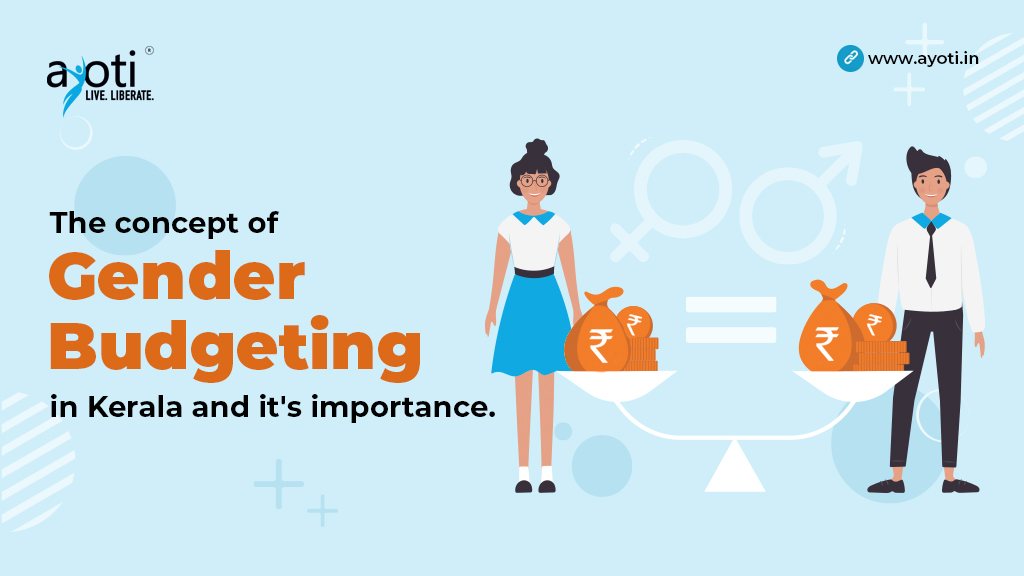The concept of Gender Budgeting in Kerala

As the primary institutions of participatory democracy, Local Self Government Institutions (LSGIs) play a critical role in promoting gender equality and equity at the regional level. The involvement and participation of women in decision making are vital to the success of LUIGI’s efforts. Women should be treated as equal partners while making decisions, not just as beneficiaries. With the help of this process, LSGIs can become more people-friendly in a broad sense and gender-friendly, especially when it comes to preserving social justice.
Gender budgeting is a new concept of development that aims to give the Budget a gendered outlook. Gender budgeting, such as ‘gender budget work,’ ‘gender-sensitive budget,’ and ‘gender budget analysis, etc.; however, all refer to the same concept. It talks about the needs and interests of a diverse range of citizens – women and men, girls and boys and aspires to devote government resources equally to meet the urgent concerns of people.
The goal of gender budgeting is to recognize how funds are distributed, how they are spent, and how public services are delivered from a gender viewpoint while implementing women’s concerns in all activities and enhancing their access to public resources.
On April 16, 2015, the Kerala government approved a “Gender Equality and Women’s Empowerment” (GEWE) policy to solidify gender equality and women’s empowerment in the state. The GEWE policy doesn’t have a development blueprint but presents a results framework to achieve gender equality. This will allow a more planned and result-oriented effort to achieve the intended outcome. The Government of Kerala published the “Gender Planning, Budgeting and Auditing Manual” on June 2 2015.
Emphasis on women’s employment 2021-22
Gender budgeting in the state is improving, with more allocations for women going up to 19.54% from 11.4% in 2017-18. In 2020-21, the total provision for women in the State budget was 18.4%.
Though the allocation for women-specific schemes has gone down from 7.3% in 2020-21 to 6.54% in the same period, signifying slow growth, the allocation for composite schemes has gone up from 11.1% to 13%.
In 2020-21, ₹1,509.33 crores were earmarked for women-specific schemes, and ₹2,300.54 crores was allocated for composite schemes, which brings the total gender budget for the year to ₹3,809.87 crores, or 18.4% of the total Plan outlay.
The total outlay for 2021-22 has increased to ₹4,025.4 crores (19.5%), with ₹1,346.91 crores allocated for women-specific components and ₹2,678.49 crores allocated for composite schemes.
Resources are distributed to support numerous projects for Kudumbashree, agriculture, animal husbandry, women and child development and fisheries under the Rebuild Kerala Initiative. This also includes sectors such as IT and industry and services.
Gender budget allocation – 2022-23
Gender budgeting in Kerala has a total outlay of ₹4,665.2 crores for 2022-23.
Women’s allocations have reached a new high of 20.9% of total Plan outlay, up from 19.54% (₹4,025.4 crores) in 2021-22.
Though the resource allocation for 90-100% women-specific schemes is 7.26% from 6.54% in 2021-22, it is 13.64% for schemes with less than 90% resource allocation, up from 13% in 2021-22. This indicates a slow yet steady growth in both categories.
The allocation for the former is ₹1,619.82 crores, up from ₹1,346.91 crores in 2021-22, and ₹3,045.38 crores for composite schemes, up from ₹2,678.49 crores.
The Gender Budget’s main goals are gender-friendly facilities and safe shelter for women. The Budget proposes 16 new schemes for incorporating gender concerns into the socio-cultural space and the existing ones. Samam, a cultural initiative for gender equality; the Nirbhaya platform’s statewide vehicle tracking platform for safety and enforcement; women sports zones; art and cultural programs for women and transgender people; special package schemes for micro, small, and medium business enterprises; and cooperative initiatives in technology-driven agriculture-based production programs are among them.
As part of the Pink Protection Project, community policing is suggested to be implemented to protect women in public, private, and digital spaces.
The Agriculture Department’s ‘Farm plan-based production programme’, which aims to increase the productivity of individual farms through multiple cropping and farming systems, has a strong women element, with 50% of the beneficiaries being women.
Child budget
The Child Budget for 2022-23 has been considerably gone up to ₹2,063.88 crores, or 9.25% of the total outlay. Last year, the allocation was ₹1,896.35 crores.
Priority is given to malnutrition children under the age of five. A new scheme for including eggs and milk two days a week in the Anganwadi menu is introduced to improve nutritional standards and achieve the sustainable development goal of hunger-free childhood. In the Budget, a total of ₹61.5 crores has been set aside for this scheme.
Furthermore, ₹2 crores are allocated for 2022-23 comprehensive rehabilitation packages for children who lost their parents due to Covid-19.
Transgender
Under various schemes, the total amount allotted to transgender people is ₹5.8 crores. The existing Mazhavillu rainbow scheme, which includes financial assistance, community-level programs, institutional treatments, provision for pension, insurance, and loan, and holding workshops, has been allocated ₹5 crores. A total of ₹30 lakhs has been set aside in the cooperative sector to employ transgender people.
To conclude
Gender budget is currently one of the strong factors in Kerala’s Budget that is becoming strong with each passing year. Furthermore, Kerala is way ahead compared to other states regarding women’s empowerment. The state even witnessed more start-ups and nano-micro enterprises in the IT and industrial sectors. With more and more privileges provided to women, gender equality is not far away, especially in Kerala. You can read all about it here:




Recent Comments